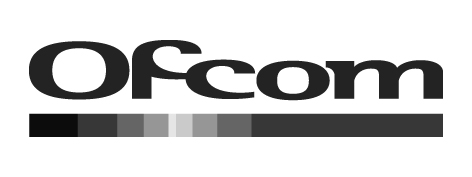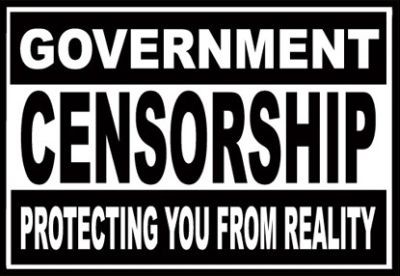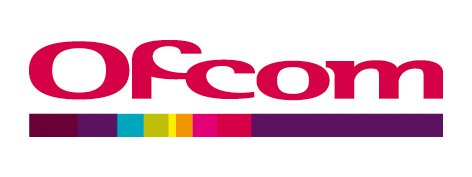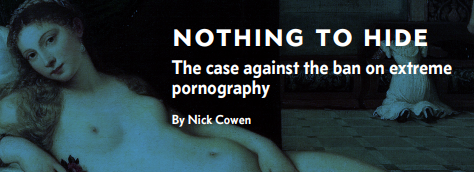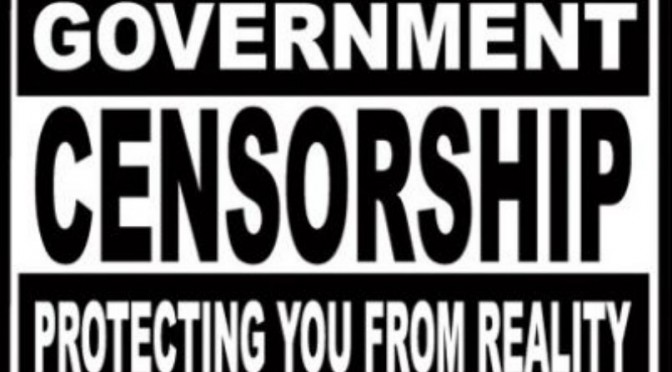This is a cross-post from my contribution to the Adam Smith Institute blog.
Last week the Crown Prosecution Service published updated guidance for prosecutions under the Obscene Publications Act (1959). Legal campaigning has brought about a big change: the liberal tests of harm, consent and legality of real acts are now key parts of their working definition of obscenity. The CPS explain:
… conduct will not likely fall to be prosecuted under the Act provided that:
- It is consensual (focusing on full and freely exercised consent, and also where the provision of consent is made clear where such consent may not be easily determined from the material itself); and
- No serious harm is caused
- It is not otherwise inextricably linked with other criminality (so as to encourage emulation or fuelling interest or normalisation of criminality); and
- The likely audience is not under 18 (having particular regard to where measures have been taken to ensure that the audience is not under 18) or otherwise vulnerable (as a result of their physical or mental health, the circumstances in which they may come to view the material, the circumstances which may cause the subject matter to have a particular impact or resonance or any other relevant circumstance).
The guidance supports a realistic notion of consent which means that depictions of most safe, consensual activities under the umbrella of BDSM are unlikely to be subject to prosecution:
“Non-consent for adults must be distinguished from consent to relinquish control. The presence of a “gag” or other forms of bondage does not, without more, suffice to confirm that sexual activity was non-consensual.”
The CPS acknowledge the damaging impact on the rule of law when prosecutors rely on subjective notions when making charging decisions:
“An ill-defined concept of moral depravity or corruption does not provide for legal demarcation of sufficient precision to enable a citizen to regulate his or her conduct. However, where conduct or an activity is itself criminalised, that may be a clear indication as to its tendency to deprave or corrupt.”
This is a substantial improvement for the OPA which has previously been used to prosecute consensual sexual expression, including publications depicting and defending LGBTQ sexual practices.
For now, the guidelines relate only indirectly to decisions to prosecute for possession of Extreme Pornography (Section 63 of the Criminal Justice and Immigration Act 2008). They appear to clarify that prosecutors should not normally be targeting depictions or records of legal acts between consenting adults. This avoids the logical incoherence at the heart of previous obscenity definitions that meant people could be prosecuted for publishing or possessing visual records of practices that were perfectly legal to conduct, such as fisting.
This is good news for liberals and anyone with an interest in freedom of sexual expression. We have to remain vigilant to see how prosecutors use these guidelines in practice. But this is at least a substantial improvement on past definitions that provided little guidance for citizens, producers or prosecutors.
What is responsible for this surprisingly liberal turn? There is little we can say with absolute certainty other than that the CPS has wisely chosen to adjust its prosecution practice to better reflect contemporary public attitudes towards minority sexual practices and porn producers.
There are a few likely contributors to this reform. Various, sometimes overlapping, strategies formed an ecology of activism and advocacy that changed the legal and policy environment. Central to the story is the civil liberties group Backlash (declaration of interest: I have volunteered my research expertise at Backlash). It began as an advocacy group, campaigning against the extension of obscenity law to include possession of extreme images that the Home Office presumed to be a necessity in the Internet age.
After the law was passed despite well-informed opposition, obscenity lawyer Myles Jackman joined Backlash as legal advisor. In a switch in strategy, Backlash started providing legal advice and financial support to defend some criminal allegations that involved consenting acts between adults.
Juries tended to favor the defence in these cases that Backlash identified as consensual. Juries rejected prosecutions for the possession of erotic horror images, possession of fisting and urethral soundings, ‘twink’ porn, as well as the sale of fisting videos. These criminal cases couldn’t set legal precedents as they never got to the stage of appeal. Nonetheless, these failed prosecutions probably deterred the CPS from pursuing many future cases.
Meanwhile, other campaigners brought this issue to wider public attention. Jerry Barnett’s website Sex and Censorship and book Porn Panic helped to link the anti-porn agenda to a wider pro-censorship movement that is now prominent in some Internet political movements. Sexual freedom campaigner, Charlotte Rose, organized a ‘face-sitting’ protest outside Parliament aimed specifically at new media regulations and helped to raise the profile of sexual freedom more generally.
The protest attracted mainstream media attention. Pandora Blake used regulatory action against her website as a test case to quash some of the more subjective regulations. Blake then ran a campaign to show that it was the Obscene Publications Act, underlying these new inconsistent and censorious regulatory practices, that needed reform. The lost cases and reaction from vulnerable parties together prompted the CPS to consult on adjusting their guidelines to better represent what the general public evidently thought to be worthy of criminalization and censorship.
Obscenity and pornography regulation has attracted a great deal of scholarly interest. Initially, from critical supporters of the ban on extreme pornography from the field of feminist legal theory. Media communications scholars, especially Feona Attwood and Clarissa Smith, in the nascent porn studies sub-discipline, challenged the idea that porn had systematically negative impacts on culture, society and the status of women.
My article, ‘Millian Liberalism and Extreme Pornography’ showed that there was a surprising overlap between the interests of queer sexual politics, including the freedom to engage in transgressive expression and a right to establish safe spaces for minorities to support and cultivate their identities, and the classical liberal approach to freedom of expression and association. My Adam Smith Institute report, ‘Nothing to Hide’ argued for making consent to legal acts the primary way of judging the legality of sexually explicit images. It prompted LGBTQ media to highlight the risks of the law for their audience, and to start quizzing the Home Office about how they intended the law to be used.
Initially, academic feminist proponents of the extreme porn ban, including Clare McGlynn, sought quite a broad application. They argued explicitly that the law should not apply to a narrow notion of harm but also to ‘cultural harm’ or the imputed indirect, social impact of the availability of pornography, not just those participating in the acts themselves). More recently, these proponents have accepted a greater role for consent in defining the limits of image prohibition.
They now focus on the problem of ‘revenge pornography’ (the non-consensual sharing of sexually explicit private images). In contrast to ‘extreme pornography’ and obscene publications in general, ‘revenge porn’ constitutes a personal violation and severe social problem that both liberals and feminists agree requires civil and criminal remedies. Fortunately, there has been some degree of agreement on where future criminal justice activity needs to be directed.
Criminal obscenity law is just one strand in a tangle of issues threatening sexual expression and freedom of expression in the UK. This change doesn’t do very much to make the government’s age verification system and broader surveillance of Internet access safe. It only marginally improves the legal protection of sex workers who use or offer online services. So there are a great deal more liberal reforms needed. Nevertheless, this success shows that campaigning, through legal challenges, protests and informed scholarship, can lead to genuine reform. I see this as a model for future campaigns aiming for greater personal liberty.
